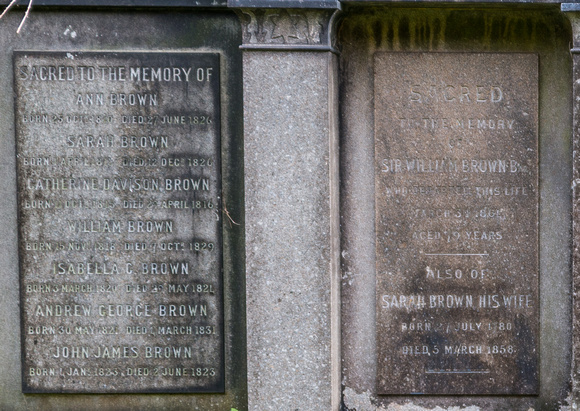Ann Brown
Sarah Brown
Catherine Davison Brown
William Brown
Isabella C Brown
Andrew George Brown
John James Brown
Sir William Brown, 1st Baronet (30 May 1784 – 3 March 1864) was a
British merchant and
banker, founder of the banking-house of
Brown, Shipley amp; Co. and a
Liberal politician who sat in the
House of Commons from 1846 to 1859
He was the eldest son of Alexander Brown of Ballymena, county Antrim, and Grace, daughter of John Davison (1764–1834) of Drumnasole, was born at
Ballymena,
Ireland on 30 May 1784. At twelve years of age he was placed under the care of the Rev. J. Bradley at Oatterick, Yorkshire, whence in 1800 he returned to Ireland.
Soon afterwards he sailed with his father and mother for the
United States of America, and at
Baltimore, Maryland, where his father continued the
linen trade in which he had been engaged in
Ireland, received in the counting-house his commercial education. He was sent with his brothers,
George (1787–1859), John (1788–1852), and James (1791–1877), to be educated at the school of the Revd J. Bradley in
Catterick, North Yorkshire.
[2] In a few years the house at Baltimore became the firm of
Alexander Brown amp; Sons, consisting of the father and his sons, William, John, George, and James.
[1]In 1809, William returned to the United Kingdom, established a branch of the firm in Liverpool, and they shortly afterwards abandoned the exclusive linen business and became general merchants. The transactions of the firm soon extended so as to require further branches. James established himself at
New York City and John at
Philadelphia, and on the death of their father the business, then the most extensive in the American trade, was continued by the four brothers, George remaining in Baltimore. The disastrous aspect of affairs in
financial crisis of 1837, induced the brothers George and John, who had by this time realised ample fortunes, to retire from the firm, leaving William the eldest and James the youngest to continue the concern. Brown persuaded the
Bank of England to advance him £2,000,000 to tide matters over in view of the firm's multiple interests. Brown only needed half the amount, which he repaid within six months. His business, both mercantile and banking, continued to increase, and in 1844 he was held one sixth of the trade between
Great Britain and the
United States. "There is hardly," declared
Richard Cobden at this period, "a wind that blows, or a tide that flows in the
Mersey, that does not bring a ship freighted with cotton or some other costly commodity for Mr Brown's house." They now became bankers in the sense of conducting transmissions of money on public account between the two hemispheres, and in this pursuit and the business of merchants they acquired immense wealth.
In 1825, William took an active part in the agitation for the reform in the management of the Liverpool
docks. He was elected an alderman of Liverpool in 1831, and held that office until 1838. He was the unsuccessful
Anti-Cornlaw League candidate for South Lancashire in 1844. In 1846, Brown was elected
Liberal M.P. for
South Lancashire, and held the seat until 23 April 1869.
He was the founder of the firm of Brown, Shipley, amp; Co., Liverpool and London merchants, and at one time was the chairman of the Atlantic Telegraph Company.
In 1856, friction arose between the British and American governments because British consuls were enlisting recruits for the
Crimean War, but this was largely allayed by Brown, who in an interview with
Lord Palmerston, then prime-minister, explained the objections taken in America.


